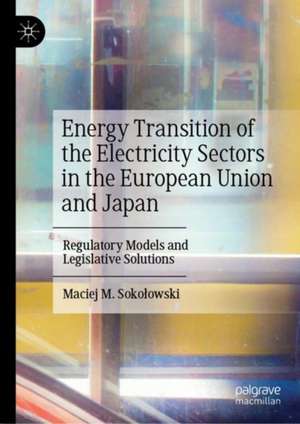Energy Transition of the Electricity Sectors in the European Union and Japan: Regulatory Models and Legislative Solutions
Autor Maciej M. Sokołowskien Limba Engleză Hardback – 9 iul 2022
| Toate formatele și edițiile | Preț | Express |
|---|---|---|
| Paperback (1) | 887.05 lei 6-8 săpt. | |
| Springer International Publishing – 9 iul 2023 | 887.05 lei 6-8 săpt. | |
| Hardback (1) | 801.71 lei 17-23 zile | +78.78 lei 4-10 zile |
| Springer International Publishing – 9 iul 2022 | 801.71 lei 17-23 zile | +78.78 lei 4-10 zile |
Preț: 801.71 lei
Preț vechi: 880.99 lei
-9% Nou
Puncte Express: 1203
Preț estimativ în valută:
153.43€ • 159.59$ • 126.66£
153.43€ • 159.59$ • 126.66£
Carte disponibilă
Livrare economică 21-27 martie
Livrare express 08-14 martie pentru 88.77 lei
Preluare comenzi: 021 569.72.76
Specificații
ISBN-13: 9783030988951
ISBN-10: 3030988953
Pagini: 246
Ilustrații: XXV, 246 p. 1 illus.
Dimensiuni: 148 x 210 x 24 mm
Greutate: 0.47 kg
Ediția:1st ed. 2022
Editura: Springer International Publishing
Colecția Palgrave Macmillan
Locul publicării:Cham, Switzerland
ISBN-10: 3030988953
Pagini: 246
Ilustrații: XXV, 246 p. 1 illus.
Dimensiuni: 148 x 210 x 24 mm
Greutate: 0.47 kg
Ediția:1st ed. 2022
Editura: Springer International Publishing
Colecția Palgrave Macmillan
Locul publicării:Cham, Switzerland
Cuprins
1: Introduction.- 2: Making the Electricity Market Work.- 3: Making the Electricity Sector Clean.- 4: Making Energy Sources Renewable.- 5: Making Energy Efficient.- 6: Making Energy Transition Just.- 7: Remaking: Conclusion.
Notă biografică
Maciej M. Sokołowski holds a PhD in law (summa cum laude), with habilitation (Doctor of Science, DSc). He is currently a Visiting Researcher at the Meiji University in Tokyo, associated with the Faculty of Law and Administration at the University of Warsaw, Poland. He is an expert in the field of energy law and regulation of the energy sector, the author of two books on energy regulation as well as about 80 papers and reports on public law and energy policy.
Textul de pe ultima copertă
This book examines a variety of laws and policies governing the European and Japanese electricity sectors. The book evaluates and compares the regulatory frameworks for achieving energy transitions in Japan and the European Union (EU) by answering a number of questions on the essence and range of the regulatory models used by leading global economies which herald carbon neutrality by 2050.
The book systematises Japanese and European energy policies and legislation including electricity-related policies, plans, and programmes. To discuss these matters in relation to the European and Japanese 2050 energy transition the book delves into the four pillars of the transition: market reform, reduction of emissions, promotion of renewables, and enhancing energy efficiency. Each chapter shows the timing of the actions undertaken both in Europe and Japan; analyses the character of the conducted actions, including the players and stakeholders of the realised agenda; and presents the technologies involved in the energy transition. These correspond with the policy goals and priorities which propelled the energy transition in the EU and Japan. The author provides answers to questions concerning the regulatory tools that Japan and the EU may use in the future, and the problems which may emerge during the implementation phase. Additionally, the book presents the lessons learned on facilitating the energy transition. The book provides an in-depth review of the EU and Japan’s energy policies and laws in terms of electricity market and climate action, including energy efficiency, renewable energy sources, and the reduction of emissions.
Maciej M. Sokołowski holds a PhD in law (summa cum laude), with habilitation (Doctor of Science, DSc). He is currently a Visiting Researcher at the Meiji University in Tokyo, associated with the Faculty of Law and Administration at the University of Warsaw, Poland. He is an expert in the field of energy law and regulation of the energy sector, the author of two books on energy regulation as well as about 80 papers and reports on public law and energy policy.
The book systematises Japanese and European energy policies and legislation including electricity-related policies, plans, and programmes. To discuss these matters in relation to the European and Japanese 2050 energy transition the book delves into the four pillars of the transition: market reform, reduction of emissions, promotion of renewables, and enhancing energy efficiency. Each chapter shows the timing of the actions undertaken both in Europe and Japan; analyses the character of the conducted actions, including the players and stakeholders of the realised agenda; and presents the technologies involved in the energy transition. These correspond with the policy goals and priorities which propelled the energy transition in the EU and Japan. The author provides answers to questions concerning the regulatory tools that Japan and the EU may use in the future, and the problems which may emerge during the implementation phase. Additionally, the book presents the lessons learned on facilitating the energy transition. The book provides an in-depth review of the EU and Japan’s energy policies and laws in terms of electricity market and climate action, including energy efficiency, renewable energy sources, and the reduction of emissions.
Maciej M. Sokołowski holds a PhD in law (summa cum laude), with habilitation (Doctor of Science, DSc). He is currently a Visiting Researcher at the Meiji University in Tokyo, associated with the Faculty of Law and Administration at the University of Warsaw, Poland. He is an expert in the field of energy law and regulation of the energy sector, the author of two books on energy regulation as well as about 80 papers and reports on public law and energy policy.
Caracteristici
Explores the two leading economies aiming to reach carbon neutrality by 2050 Examines the energy transition from a regulatory standpoint in an all-encompassing way Comprehensively addresses the EU and Japan's climate-energy challenges thus filling the market gap
